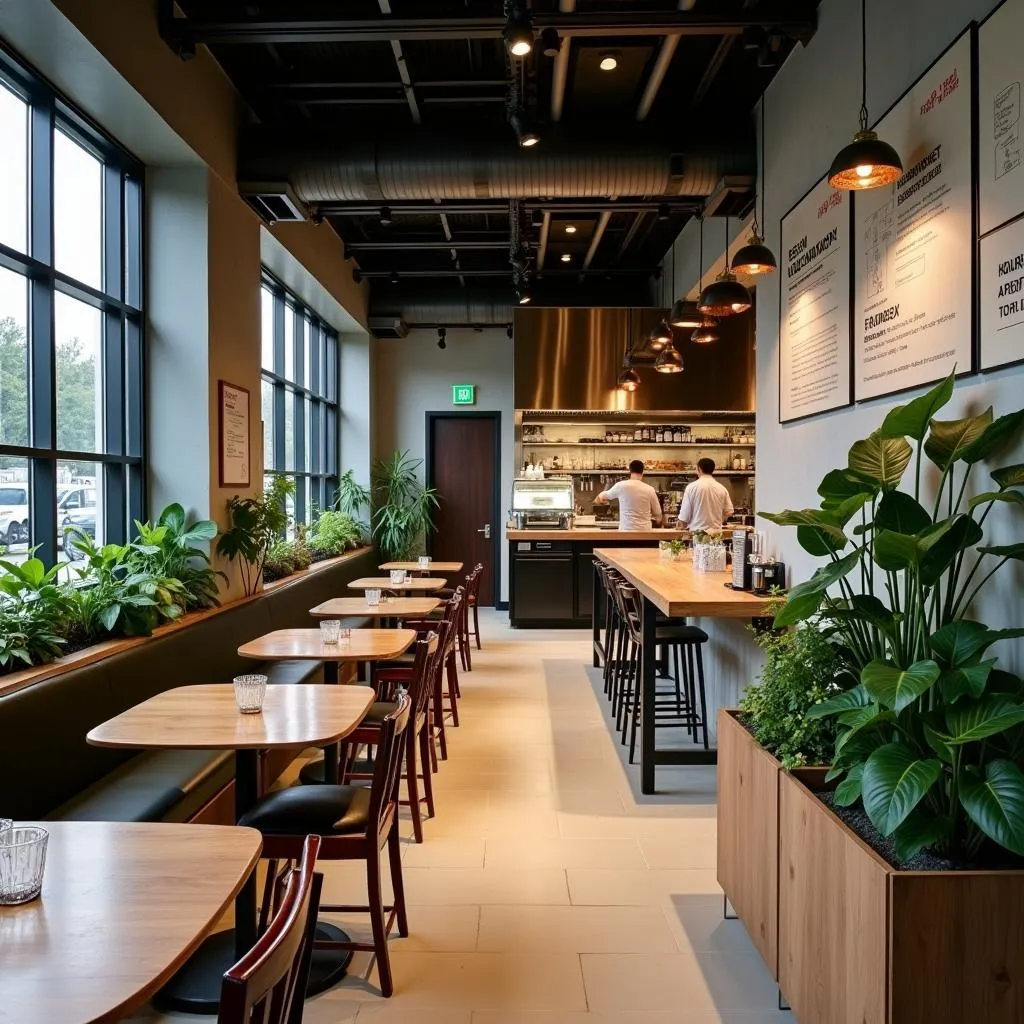The topic of describing a memorable time at a restaurant is a popular one in IELTS Speaking tests. It’s likely to appear in future exams as it allows examiners to assess candidates’ ability to recount personal experiences, use descriptive language, and express opinions. Let’s explore how to effectively tackle this topic across all parts of the IELTS Speaking test.
Nội dung bài viết
Part 1: Introduction and Interview
In this section, the examiner may ask general questions about restaurants and dining experiences. Here are some common questions and suggested answers:
-
Do you often eat out at restaurants?
Sample answer (Band 7-8):
“Yes, I do enjoy dining out quite frequently. On average, I’d say I eat at restaurants about twice a week. It’s a great way to socialize with friends and try new cuisines without having to cook myself.” -
What’s your favorite type of restaurant?
Sample answer (Band 8-9):
“I’m particularly fond of authentic Italian restaurants. There’s something magical about the combination of fresh pasta, aromatic herbs, and rich sauces. I also appreciate the warm, convivial atmosphere that’s often found in Italian eateries.” -
Do you prefer eating alone or with others at restaurants?
Sample answer (Band 7-8):
“I definitely prefer eating with others. Sharing a meal is a great way to bond with friends or family. It allows for engaging conversations and creates lasting memories. Plus, dining with others means you can sample a wider variety of dishes!”
Part 2: Long Turn (Cue Card)
Here’s a sample cue card related to the topic:
Describe a memorable time at a restaurant.
You should say:
- Where the restaurant was
- What kind of restaurant it was
- Who you were with
- Why it was memorable
And explain how you felt about the experience.
Sample Answer (Band 8-9):
“I’d like to share a truly unforgettable dining experience I had last summer at a charming little seafood restaurant called ‘The Oyster’s Pearl’. It was nestled in a picturesque coastal village about an hour’s drive from my hometown.
The restaurant specialized in locally-sourced seafood and had a rustic yet elegant ambiance. The interior was adorned with nautical decor, featuring weathered wood and soft, warm lighting that created an intimate atmosphere.
I was there celebrating my parents’ 30th wedding anniversary, along with my sister and her husband. It was a joyous family gathering, made even more special by the exceptional dining experience.
What made this outing truly memorable was a combination of factors. Firstly, the food was absolutely exquisite. We started with a platter of fresh oysters that tantalized our taste buds with their briny freshness. The main course, a succulent grilled sea bass, was cooked to perfection and melted in our mouths.
Secondly, the service was impeccable. Our waiter was not only attentive and knowledgeable about the menu, but also regaled us with fascinating stories about the local fishing industry and the restaurant’s history.
Lastly, the breathtaking view of the sun setting over the ocean from our table added a magical touch to the whole experience. It created the perfect backdrop for our family celebration.
I felt thoroughly satisfied and grateful for this experience. It wasn’t just about the delicious food or the beautiful setting; it was about sharing a special moment with my loved ones in such a delightful environment. This dinner left an indelible mark on my memory, and I often find myself reminiscing about it with fondness.”
 Family celebrating at a seafood restaurant
Family celebrating at a seafood restaurant
Follow-up Questions
-
What made the service at this restaurant stand out?
Sample answer (Band 8-9):
“The service was truly exceptional. The staff demonstrated an impressive level of professionalism combined with genuine warmth. They were extremely attentive without being intrusive, anticipating our needs before we even expressed them. Their in-depth knowledge of the menu and wine pairings elevated our dining experience significantly.” -
How do you think restaurants can create memorable experiences for their customers?
Sample answer (Band 7-8):
“I believe restaurants can create memorable experiences by focusing on several key aspects. Firstly, consistently delivering high-quality food is crucial. They should also pay attention to the ambiance and decor to create a unique atmosphere. Excellent customer service is another vital factor. Lastly, offering some form of unique selling point, whether it’s a spectacular view, an open kitchen, or a signature dish, can make the experience stand out.”
Part 3: Two-way Discussion
In this part, the examiner will ask more abstract questions related to restaurants and dining experiences. Here are some potential questions and sample answers:
-
How have dining habits changed in your country over the past few decades?
Sample answer (Band 8-9):
“There’s been a significant shift in dining habits in my country over recent decades. Notably, there’s been a surge in the popularity of international cuisines, reflecting our increasingly globalized palate. We’ve also seen a growing trend towards healthier eating, with many restaurants now offering vegetarian, vegan, and low-calorie options.Another interesting development is the rise of ‘experiential dining’, where restaurants offer more than just food – they provide a unique atmosphere or interactive elements. This could be anything from themed restaurants to places where you cook your own meal.
Additionally, the advent of food delivery apps has revolutionized how people consume restaurant meals, making it easier than ever to enjoy restaurant-quality food at home. This has led to a proliferation of ‘dark kitchens’ or ‘ghost restaurants’ that only offer delivery services.
Lastly, there’s been an increased focus on sustainability and ethical sourcing in the restaurant industry. Many diners now expect restaurants to be transparent about where their ingredients come from and to have environmentally friendly practices.”
 Modern restaurant interior emphasizing sustainable dining
Modern restaurant interior emphasizing sustainable dining
-
Do you think the quality of service is more important than the quality of food in a restaurant?
Sample answer (Band 7-8):
“In my opinion, both the quality of service and the quality of food are crucial components of a good dining experience, but I believe the food quality slightly edges out in importance. After all, the primary reason people go to restaurants is to enjoy a good meal.That being said, exceptional service can elevate an average meal, while poor service can mar even the most delicious food. Good service creates a pleasant atmosphere, makes customers feel valued, and can smooth over any small issues that might arise.
Ideally, a restaurant should strive for excellence in both areas. A perfect balance of delicious food and attentive, friendly service is what truly makes a restaurant stand out and keeps customers coming back.”
-
How might restaurants need to adapt in the future?
Sample answer (Band 8-9):
“Restaurants will likely need to adapt in several ways to meet changing consumer demands and technological advancements. Firstly, they may need to become more flexible in their service models, offering a seamless experience across dine-in, takeaway, and delivery options.Sustainability will probably become even more critical. Restaurants might need to adopt more eco-friendly practices, such as reducing food waste, using biodegradable packaging, and sourcing ingredients locally and ethically.
Technology integration is another area where we’re likely to see significant changes. This could include more sophisticated ordering systems, perhaps using augmented reality to preview dishes, or AI-powered recommendations based on customer preferences.
We might also see a shift towards more personalized dining experiences. This could involve customizable menus, catering to specific dietary requirements, or even using genetic information to recommend dishes that align with an individual’s nutritional needs.
Lastly, as people become more health-conscious, restaurants may need to provide more transparent nutritional information and offer a wider range of healthy options without compromising on taste or dining experience.”
Key Vocabulary and Phrases for High Scores
-
Culinary delight (noun) – /ˈkʌlɪnəri dɪˈlaɪt/ – A delicious food or meal
Example: “The chef’s special was a culinary delight that exceeded our expectations.” -
Ambiance (noun) – /ˈæmbiəns/ – The character and atmosphere of a place
Example: “The soft lighting and jazz music created a relaxing ambiance in the restaurant.” -
Gastronomic (adjective) – /ˌgæstrəˈnɒmɪk/ – Relating to good food and cooking
Example: “The city is known for its gastronomic excellence, boasting several Michelin-starred restaurants.” -
Palate (noun) – /ˈpælət/ – A person’s ability to distinguish between and appreciate different flavors
Example: “The complex flavors of the dish impressed even the most refined palates.” -
Impeccable (adjective) – /ɪmˈpekəbl/ – In accordance with the highest standards; faultless
Example: “The waiter’s attention to detail was impeccable throughout our meal.”
Describe a meal you shared with friends in a restaurant can be another interesting topic to explore in your IELTS Speaking preparation.
Examiner’s Advice
To score high in the IELTS Speaking test when describing a memorable restaurant experience:
-
Use a wide range of vocabulary related to food, restaurants, and experiences. Don’t just say food was “good” – use words like “delectable”, “mouth-watering”, or “exquisite”.
-
Practice describing all aspects of the experience – not just the food, but the ambiance, service, company, and your feelings.
-
Use a variety of grammatical structures, including complex sentences and different tenses to recount your experience.
-
Show your ability to express and justify opinions about restaurants and dining experiences.
-
Be prepared to extend the topic to more abstract discussions about food culture, the restaurant industry, or societal trends in dining.
Remember, regular practice is key to improving your speaking skills. Try describing different restaurant experiences to friends or record yourself speaking. This will help you become more comfortable and fluent when discussing this topic in the actual test.
Describe a time when you stayed in a hotel is another common topic that can help you practice describing experiences in detail.


